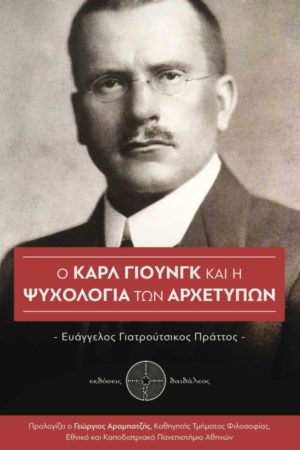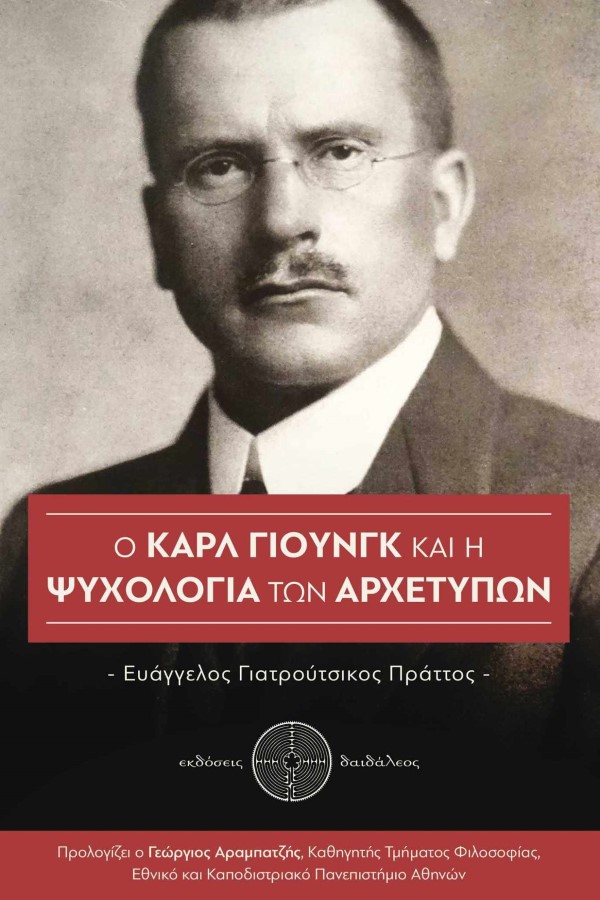ΣΥΝΕΝΤΕΥΞΗ ΜΕ ΤΟΝ ΕΥΑΓΓΕΛΟ ΓΙΑΤΡΟΥΤΣΙΚΟ ΠΡΑΤΤΟ: «Η ΣΑΓΗΝΗ ΤΩΝ ΑΡΧΕΤΥΠΩΝ ΕΙΝΑΙ ΑΠΟΡΡΟΙΑ ΤΟΥ ΜΥΣΤΗΡΙΟΥ ΤΟΥΣ»
παίρνει συνέντευξη ο Ευθύμιος Ιωαννίδης
Ο Ευάγγελος Γιατρούτσικος Πράττος γεννήθηκε και µεγάλωσε στην Αθήνα. Είναι αριστούχος απόφοιτος του προπτυχιακού προγράµµατος «Σπουδές στον Ευρωπαϊκό Πολιτισµό» του Ε.Α.Π. και του µεταπτυχιακού προγράµµατος «Φιλοσοφία» του Ε.Κ.Π.Α., µε ειδίκευση στην «Ιστορία της Φιλοσοφίας και των Ιδεών». Έχει λάβει µέρος σε επιστηµονικά συνέδρια και έχει δηµοσιεύσει άρθρα του σε επιστηµονικά περιοδικά. Παράλληλα, είναι αρχισυντάκτης και ιδρυτικό µέλος της ιστοσελίδας The Weird Side Daily, ενώ έχει την τιµή να συµµετέχει σε επτά λογοτεχνικές συλλογές. Επιπλέον, το 2019 του απονεµήθηκε το Β΄ Βραβείο «Φανταστικού Διηγήµατος Νέων». Παρακολουθεί συχνά σεµινάρια γύρω από τη φιλοσοφία, την ιστορία και την ψυχολογία και ασχολήθηκε για χρόνια µε τη µουσική. Στα ερευνητικά του ενδιαφέροντα εντάσσονται ζητήµατα οντολογίας, αισθητικής και ηθικής φιλοσοφίας, µυστικής θεολογίας και ψυχολογίας του βάθους
Ποιο ήταν το έναυσμα να ασχοληθείτε με το ζήτημα των Αρχετύπων;
Η σαγήνη των αρχετύπων είναι απόρροια του μυστηρίου τους. Η απροσπέλαστη ουσία τους, η συμβολική γλώσσα τους, η σύνδεσή τους με το όνειρο και τον μύθο, με το παραμύθι και το υπερβατικό, ενισχύει τον αινιγματικό χαρακτήρα τους. Η πρώτη μου επαφή με τον στοχασμό του Jung, έγινε μέσα από μία μελέτη του Edward Armstrong Bennet, ο οποίος ήταν φίλος και συνεργάτης του Ελβετού ψυχιάτρου. Κατά την ανάγνωση του βιβλίου του, μου κέντρισε το ενδιαφέρον ένα κεφάλαιο το οποίο αναφερόταν στο ζήτημα των αρχετύπων. Από εκεί και έπειτα, εστίασα τη μελέτη μου στα έργα του ίδιου του Jung και τα αρχέτυπα απέκτησαν κυρίαρχη θέση στην έρευνά μου. Αρκετά χρόνια αργότερα, είχα την τύχη να συναντήσω έναν άνθρωπο ο οποίος με ενέπνευσε και συνέπεσε να μοιραζόμαστε κοινά ενδιαφέροντα όσον αφορά τη μελέτη των αρχετυπικών ιδεών. Πρόκειται για τον επόπτη καθηγητή της διπλωματικής μου εργασίας κ. Γεώργιο Αραμπατζή ο οποίος προλογίζει το βιβλίο.
Οι έρευνες αναφορικά με την αναλυτική ψυχολογία του Jung, ιδίως στον δυτικό κόσμο έχουν πληθύνει. Στη χώρα μας αντιθέτως οι σχετικές μελέτες είναι περιορισμένες. Τι δυσκολίες αντιμετωπίσατε κατά της συγγραφή της μελέτης σας;
Η κύρια δυσκολία που αντιμετώπισα ήταν ο περιορισμένος κύκλος ερευνητών της γιουνγκιανής ψυχολογίας στην Ελλάδα, έτσι ώστε να αναπτυχθεί μια εποικοδομητική ανταλλαγή ιδεών και απόψεων. Ωστόσο, είχα την τιμή να δεχτεί την πρότασή μου για διδακτορική έρευνα ο κ. Σπυρίδωνας Τσιτσίγκος ο οποίος εξειδικεύεται στο αντικείμενο της Ψυχολογίας της Θρησκείας και έχει αφιερώσει μεγάλο μέρος της έρευνάς του στην αναλυτική ψυχολογία. Με την καθοδήγησή του και την εμπειρία του, θέλω να πιστεύω πως θα αναδειχθούν νέες προοπτικές όσον αφορά την έρευνα για τα αρχέτυπα. Επίσης, έχω τη χαρά εδώ και κάποιους μήνες να έχω έρθει κοντά με τον μεταδιδακτορικό ερευνητή Πέτρο Παπαποστόλου (βλ. «Το Αρχέτυπο του Θεού» Εκδόσεις Δαιδάλεος), ο οποίος έχει πολύ καλό γνωστικό υπόβαθρο και έχει ερευνήσει σε βάθος τα κείμενα του Jung. Ως αποτέλεσμα των παραπάνω, έχει ξεκινήσει ένας γόνιμος διάλογος σε επιστημονικό επίπεδο, ο οποίος ελπίζω να φέρει κάποια θετικά αποτελέσματα στο εγγύς μέλλον.
Θα ήθελα στο σημείο αυτό αν δεν έχετε αντίρρηση να μας ορίσετε αδρομερώς την έννοια της λέξης αρχέτυπο…
Το τι ακριβώς είναι ένα αρχέτυπο αποτελεί ένα αρκετά πολύπλοκο ζήτημα, όπως θα καταλάβει γρήγορα ο αναγνώστης του βιβλίου. Αυτό συμβαίνει κυρίως διότι αντιλαμβανόμαστε τη δυναμική του αρχετύπου εκ του αποτελέσματος. Πρόκειται για μία πολυπρισματική έννοια η οποία διανοίγεται σε αρκετά ετερόκλητους κλάδους (επιστημονικούς και μη) και αφήνει πολλά ερωτήματα αναπάντητα. Για να είμαστε πιο ακριβείς, πρόκειται για έννοια και εμπειρία παράλληλα, για εικόνα και βίωμα, ενώ θα μπορούσε ένα αρχέτυπο να γίνει αντιληπτό και ως ένα apriori μοτίβο συμπεριφοράς το οποίο εκφράζεται ως ψυχική απαίτηση. Θα προτιμούσα λοιπόν να μην δώσω περαιτέρω πληροφορίες, διότι θα ήθελα να αφήσω την περιπέτεια της ανακάλυψης στον αναγνώστη. Πιστεύω πως με τη μελέτη του βιβλίου θα εντοπίσει πλούσια βιβλιογραφία και υλικό, έτσι ώστε να μπορέσει να εμβαθύνει παραπάνω στο συγκεκριμένο θέμα.

Το συλλογικό μας ασυνείδητο πόσο καθοριστικό και επιδραστικό είναι θα λέγατε στη συμπεριφορά μας;
Αν λάβουμε υπόψη τις εκτενείς μελέτες του Jung και την πολύχρονη κλινική του εμπειρία, θα μπορούσε να ειπωθεί πως είναι καθοριστική η επιρροή των αρχετύπων στον ψυχικό μας κόσμο. Το συλλογικό ασυνείδητο ή αλλιώς η χώρα των πνευμάτων στη γλώσσα των πρωτογόνων, είναι η ψυχολογική επικράτεια η οποία «φιλοξενεί» τα αρχέτυπα. Υπάρχουν περιστάσεις οι οποίες «ενεργοποιούν» αρχετυπικά μοτίβα τα οποία τείνουν να παρουσιάζονται ως ψυχικές απαιτήσεις. Μέσα από τη θεραπευτική διαδικασία και με επίπονη προσωπική προσπάθεια, είναι πιθανό να εξελιχθεί ομαλά η πορεία της εξατομίκευσης. Απώτερος σκοπός είναι να διευρυνθεί η συνειδητότητα του ατόμου και να γνωρίσει πτυχές του εαυτού του (ατομικές και συλλογικές) οι οποίες μέχρι πρότινος του ήταν άγνωστες, με στόχο να φτάσει στο ασυνείδητο βάθος, στο αρχέτυπο της ολότητας το οποίο μας καλεί και παράλληλα το δημιουργούμε.
Πόσο επίκαιρος θα λέγατε ότι είναι ο Jung και οι θεωρίες του σε έναν κόσμο που συνεχώς μεταβάλλεται;
Ο Jung αποτελεί έναν σημαντικό σταθμό στην ιστορία των ιδεών και η σύγχρονη ψυχολογία και ψυχιατρική δεν θα μπορούσε να γίνει κατανοητή δίχως το έργο του σπουδαίου αυτού στοχαστή. Υπάρχει μια τάση παραγκώνισης και δαιμονοποίησης της γιουνγκιανής σκέψης, ενώ από πολλούς ακαδημαϊκούς αντιμετωπίζεται ως ένα ξεπερασμένο κομμάτι της ιστορίας της ψυχολογίας. Προσωπικά στέκομαι δίπλα σε αυτούς που προσεγγίζουν με σεβασμό και αγάπη το έργο του Jung. Η σκέψη του Jung είναι ψυχο-κεντρική, βαθιά πνευματική και σε μεγάλο βαθμό διαποτισμένη από έντονη ενσυναίσθηση και κοινωνικές ανησυχίες. Θα μπορούσε, λοιπόν, να αποτελέσει ένα σημαντικό θεραπευτικό εργαλείο για τις δυσκολίες που βιώνουμε καθημερινά σε ατομικό και συλλογικό επίπεδο.
Η επαφή και η ενασχόληση με τον φιλοσοφικό κόσμο και ευρύτερα θεωρητικό κόσμο του Jung θα λέγατε πως έχει επηρεάσει τον τρόπο που αντιμετωπίζετε την πραγματικότητα;
Η ενασχόληση με τη φιλοσοφία διεύρυνε σημαντικά την αντίληψή μου και σίγουρα με έκανε να αμφισβητήσω πολλά πράγματα τα οποία θεωρούσα αυτονόητα. Πιο συγκεκριμένα, ανέδειξε την πολλαπλότητα των ερμηνειών εκείνου που θεωρούμε «πραγματικού» ή αυτονόητου. Όσον αφορά την αναλυτική ψυχολογία, ο Jung είχε ένα τρομερό χάρισμα να μετατρέπει το σκοτάδι σε φως. Όπως είναι ευρέως γνωστό πέρασε αρκετές σκοτεινές περιόδους στη ζωή του, έφθασε στο ναδίρ και αναδύθηκε σοφότερος από ποτέ.
Δεν το έβαλε κάτω και δεν φοβήθηκε να κοιτάξει τον άνθρωπο με καθαρό μάτι: με τις αδυναμίες του, τις μικροπρέπειές του, το μεγαλείο του και τις δυνατότητές του. Προσωπικά, δεν είμαι κάποιου είδους ειδικός, ούτε κάποιος που έχει λύσει οριστικά τα ζητήματά του μέσα από την τριβή του με τη φιλοσοφία και την ψυχολογία του βάθους.
Νιώθω, απλώς, κάπως διαισθητικά, πως βρίσκομαι στην αρχή ενός ταξιδιού προς το/τον Άγνωστο. Η καθημερινότητά μου είναι δύσκολη όπως όλων και πολλές φορές αντιμετωπίζω τα πράγματα με αμφιβολία και δισταγμό. Αυτό που μου έδωσαν οι σπουδές μου και οι μελέτες μου, είναι η δυνατότητα μιας κριτικής αποστασιοποίησης και εποπτείας κατά την οποία μπορώ να κατανοήσω πολλά αλλά συνήθως είμαι σε θέση να αλλάξω λίγα. Όπως εξηγεί και ο Schelling όσο αυξάνεται η αυτοσυνειδησία ενός ανθρώπου τόσο περισσότερο κατανοεί πως δεν θα μπορούσε να πράξει διαφορετικά απ΄ό,τι πράττει.
Πιστεύω κατά μία έννοια στο αναπόδραστο, με μια κρυφή ελπίδα πως κάποια στιγμή θα επιτευχθεί αυτή η μυστηριακή μετάβαση από το προσωπείο (persona) προς το πρόσωπο και από άτομο θα γίνω ά-τομο, δηλαδή μια ψυχολογική ολότητα (πρόσωπο) σε ανεμπόδιστη επαφή με το οντολογικό της κέντρο, την εικόνα του Θεού μέσα μας ή αλλιώς με το αρχέτυπο του Εαυτού.
Δείτε τη συνέντευξη στο https://thessculture.gr/vivlia/synenteyxi-me-ton-eyaggelo-giatroyts/
Σε ενδιαφέρει η ψυχολογία & το πνεύμα;
Βρες τα πληρέστερα βιβλία από τις Εκδόσεις Δαιδάλεος εδώ

